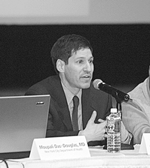Several gay, AIDS groups respond positively to health commissioner’s HIV proposals
The commissioner, Dr. Thomas R. Frieden, wants to change state law to allow healthcare providers to do HIV testing after a patient gives verbal consent. Frieden has argued that doctors avoid HIV testing because getting written consent is inconvenient and ending the requirement for it will result in HIV testing becoming routine in doctor’s offices.
Frieden also wants to change state law to allow his department to use data that it already collects to assist in the treatment of people with AIDS.
Doctors and testing labs currently must report positive HIV tests and AIDS diagnoses as well as the results of tests that measure the amount of HIV in a person’s blood, that measure the state of a patient’s immune system, and that show which anti-HIV drugs, if any, a virus has resistance to.
State law bars the health department from using those test results for anything other than the tracing of sexual contacts and epidemiological studies.
On February 16, the Latino Commission on AIDS (LCOA) issued a statement that endorsed ending written consent though the group insisted that testing remain voluntary and that verbal consent be documented.
“It could be as simple as a note in the patient’s records,” said Dennis deLeon, LCOA’s president. “We just don’t want the patient coming back and saying I never gave my consent… We feel a doctor’s note in the chart is enough evidence that consent was given.”
Similarly, Harlem United supports ending written consent while keeping HIV testing voluntary and noting that verbal consent was given in patient records.
“We’re really advocating for separate oral consent documented by the provider as opposed to separate written consent documented by the patient,” said Patrick J. McGovern, executive director of the AIDS services group.
A health department bulletin that was released the week of February 6 caused some concern for McGovern. Titled “Making HIV Testing a Routine Part of Medical Care,” it provided three sample conversations that a doctor could have with a patient in which the doctor tells the patient he will test them for HIV and says only, “Do you have any questions?”
In a February 17 e-mail, McGovern wrote, “This candidly indicates that [the health department] may be seeking not only the elimination of separate written consent, but also separate oral consent.”
More controversial is the proposal to allow the health department to monitor the treatment of people with AIDS.
Jay Laudato, executive director of the Callen-Lorde Community Health Center, a gay clinic, said that if Frieden was proposing monitoring how clinic staff were performing that would be fine, but contacting patients directly was not.
“We should be supervised by government,” he said. “I welcome that. If they say I’m doing something wrong, I don’t
want to do something wrong.”
Both Callen-Lorde and Harlem United are licensed primary care facilities and they are subject to twice-yearly performance audits by the state health department. Harlem United is also opposed to allowing the health department to contact patients directly.
“The issue with that really is maintaining the confidentiality of that database,” McGovern said. “You really want as few people having access to it as possible. Because it has been treated as a lockbox for all these years, there have been very few violations if any.”
The group’s statement noted that the test results could be used to improve “quality assurance and care coordination,” but this could be done “without any change or without significant change to current regulations and most pointedly without granting [the health department] the right to contact a particular person without their consent.”
LCOA’s support was also contingent on restricting contacts to those between providers and the city health department only. Frieden presented his proposals to the group’s board on February 9 and they believed he was proposing contacts between providers and the department only, deLeon said.
“We assumed it would be the providers,” he said. If Frieden wants to contact patients then “We would have to seriously reconsider that,” deLeon said.
All three groups indicated that there was much about the proposals that remained unclear to them and their positions might change depending on the final proposals.
“Globally, I don’t feel like we have enough information about what the commissioner is proposing to evaluate if the proposals will achieve the goals he has laid out,” Laudato said.
DeLeon agreed.
“If he puts into the language something that we don’t like then all bets are off,” he said.
gaycitynews.com

































